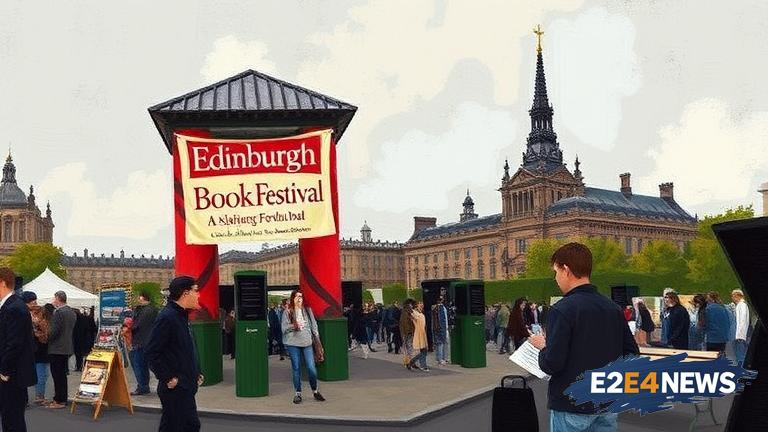The Edinburgh Book Festival, once a celebration of literature and free expression, has become a platform for regime literature, prioritizing politically correct themes and authors over diverse and innovative writing. This shift has led to a decline in the festival’s quality and appeal, with many attendees and authors expressing disappointment and frustration. The festival’s organizers have been accused of censorship, with some authors being excluded or marginalized due to their views or backgrounds. The emphasis on regime literature has also led to a lack of diversity in the festival’s programming, with many events and panels focusing on similar themes and ideas. This has resulted in a lack of engagement and debate, with attendees often being presented with a narrow and predictable range of perspectives. The festival’s focus on regime literature has also had a chilling effect on free speech, with many authors and attendees feeling reluctant to express their opinions or challenge the dominant narratives. The Edinburgh Book Festival’s decline is a symptom of a broader trend in the literary world, where regime literature is increasingly dominant and diverse voices are being marginalized. This trend is not only stifling creativity and innovation but also undermining the principles of free speech and open debate. The festival’s organizers must take steps to address these concerns and promote a more diverse and inclusive range of voices and perspectives. This can be achieved by actively seeking out and showcasing authors and writers from a wide range of backgrounds and perspectives, and by creating a safe and welcoming space for attendees to engage in open and respectful debate. The Edinburgh Book Festival has the potential to be a vibrant and dynamic celebration of literature and free expression, but it must be willing to challenge the dominant narratives and promote a more diverse and inclusive range of voices. The festival’s future depends on its ability to adapt and evolve, and to prioritize the values of free speech, creativity, and innovation. The literary world is at a crossroads, and the Edinburgh Book Festival must decide whether it will continue to promote regime literature or take a stand for diversity, inclusivity, and free expression. The festival’s organizers have a responsibility to the literary community and to the wider public to promote a more nuanced and diverse range of perspectives, and to create a space where authors and attendees can engage in open and respectful debate. The Edinburgh Book Festival’s decline is a wake-up call for the literary world, and it is up to the festival’s organizers and the wider literary community to take action and promote a more diverse and inclusive range of voices and perspectives. The festival’s focus on regime literature has also had a negative impact on the literary world, with many authors and writers feeling pressured to conform to the dominant narratives and themes. This has resulted in a lack of innovation and creativity, with many authors and writers feeling reluctant to take risks or challenge the status quo. The Edinburgh Book Festival must take steps to address these concerns and promote a more diverse and inclusive range of voices and perspectives. The festival’s organizers must be willing to challenge the dominant narratives and promote a more nuanced and diverse range of perspectives. The literary world is in need of a vibrant and dynamic celebration of literature and free expression, and the Edinburgh Book Festival has the potential to be just that. However, the festival’s organizers must be willing to take a stand for diversity, inclusivity, and free expression, and to prioritize the values of creativity, innovation, and open debate. The Edinburgh Book Festival’s future depends on its ability to adapt and evolve, and to promote a more diverse and inclusive range of voices and perspectives. The festival’s organizers have a responsibility to the literary community and to the wider public to promote a more nuanced and diverse range of perspectives, and to create a space where authors and attendees can engage in open and respectful debate. The literary world is at a crossroads, and the Edinburgh Book Festival must decide whether it will continue to promote regime literature or take a stand for diversity, inclusivity, and free expression. The festival’s decline is a symptom of a broader trend in the literary world, where regime literature is increasingly dominant and diverse voices are being marginalized. This trend is not only stifling creativity and innovation but also undermining the principles of free speech and open debate. The Edinburgh Book Festival must take steps to address these concerns and promote a more diverse and inclusive range of voices and perspectives. The festival’s organizers must be willing to challenge the dominant narratives and promote a more nuanced and diverse range of perspectives. The literary world is in need of a vibrant and dynamic celebration of literature and free expression, and the Edinburgh Book Festival has the potential to be just that.
